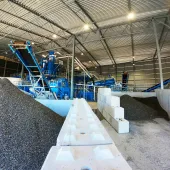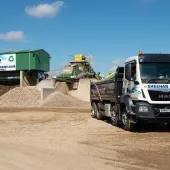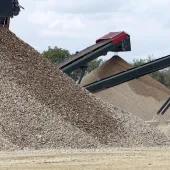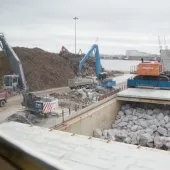Are you prepared for an oil spill?

Oil and chemical spills causing unnecessary environmental damage, says site safety equipment firm
EVERY year the Environment Agency responds to 350 serious pollution incidents caused by construction companies, the vast majority of these are oil spills that have not been effectively contained due to inadequate cleaning systems.
Site safety equipment specialists OnSite Support say that many of these spills would be less harmful to the environment if they were treated quickly with the right cleaning materials for the job.
‘Providing and stocking enough of the correct response equipment – including oil or hydrocarbon spill kits, spill-containment items, absorbent products and other spill-response tools on site – is critical to a clean-up team’s ability to effectively contain a situation when it happens on site,’ explained Chris Wellgreen, OnSite Support’s safety equipment expert.
While there is a wide range of products on the market, which claim to clean up and contain oil-based spills, he warns that some are more effective in the long term than others.
‘Many absorbent products don’t retain absorbed oil for long,’ said Mr Wellgreen. ‘So once the spillage has been cleaned up and disposed of, it can still leak into the ground, polluting and damaging the environment.’
Some of the most successful and eco-friendly absorbent materials for containing land and water spills are organic products such as peat moss, straw and wool, which repel water and absorb oily liquid.
‘Peat moss is a particularly effective and inexpensive sorbent for hydrocarbon and chemical spills such as diesel oil, petrol, paint and brake fluid leaks, and there are a variety of good purpose-designed products available on the market,’ said Mr Wellgreen.
‘Sustainable solutions like SaveSorb, which we recommend, work like a ‘super sponge’ by permanently soaking up spillage, heavy metal contaminants and toxic vapours on contact.’
SaveSorb is a responsibly harvested Canadian sphagnum moss that is dried, treated and pH balanced, and comes in a wide range of formats and spill kits, including absorbent mats and water-filtration systems.
‘It acts by trapping oily substances inside its molecular structure so that they don’t leach out into the environment, even under pressure,’ explained Mr Wellgreen. ‘The product also provides a habitat for naturally occurring microbes which break down hydrocarbons into organic carbon compounds within a relatively short time.’
With the Environment Agency and other government bodies putting increasing pressure on construction firms to clean up their environmental act, Mr Wellgreen believes companies have everything to gain from being properly prepared and equipped for a chemical oil spill.
‘Apart from the obvious benefit of protecting the environment, your workforce and the communities you impact, having trained staff with the right kit for the job, will avoid expensive fines and clean-up costs, and protect your business reputation.’









